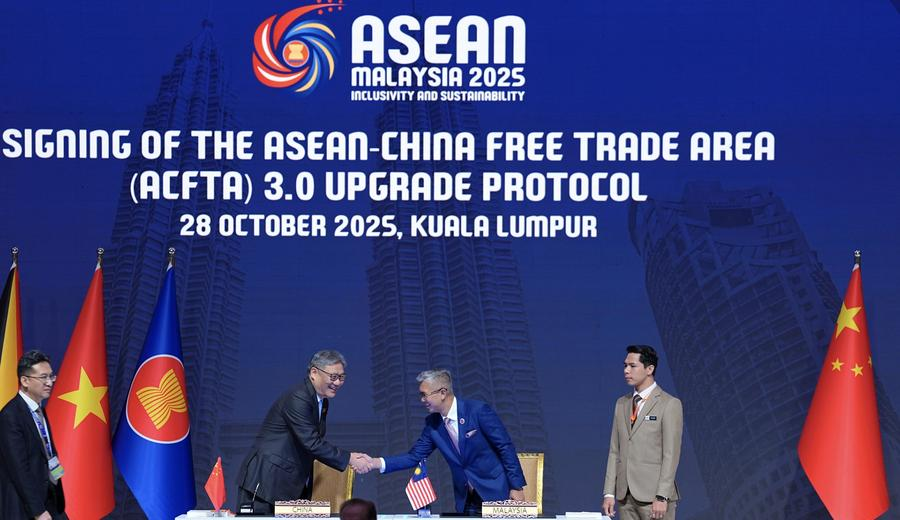Chinese Premier Li Qiang attends the 28th China-ASEAN Summit in Kuala Lumpur, Malaysia, Oct. 28, 2025. (Xinhua/Li Xiang)
The China-ASEAN Free Trade Area (CAFTA) 3.0 upgrade shows China's and ASEAN's resolve to jointly build an open, inclusive, and rules-based regional integrated market and a resilient regional industrial and supply chain system that delivers mutual benefits, and will inject more confidence and momentum into regional and global economic growth.
KUALA LUMPUR, Oct. 28 (Xinhua) -- Chinese Premier Li Qiang said here on Tuesday that the newly signed China-ASEAN Free Trade Area (CAFTA) 3.0 upgrade heralds a new opportunity to expand and enhance bilateral economic and trade cooperation.
Li made the remarks at the 28th China-ASEAN Summit held in Kuala Lumpur on Tuesday morning. Before the summit, Li and Malaysian Prime Minister Anwar Ibrahim witnessed the signing of the CAFTA 3.0 Upgrade Protocol.
At the signing ceremony, against the backdrop of the national flags of China and the member states of the Association of Southeast Asian Nations (ASEAN), Chinese Commerce Minister Wang Wentao and Malaysian Minister of Investment, Trade and Industry Tengku Zafrul Abdul Aziz inked their respective documents flanked by Premier Li and Prime Minister Anwar. Then the Malaysian minister presented the document to ASEAN Secretary-General Kao Kim Hourn.
China and ASEAN sign Free Trade Area 3.0 Upgrade Protocol in Kuala Lumpur, Malaysia, Oct. 28, 2025. (Xinhua/Xing Guangli)
Beyond tariff cuts and smoother trade, the upgraded document expands cooperation into nine areas, namely digital economy, green economy, supply chain connectivity, standards and technical regulations with conformity assessment procedures, sanitary and phytosanitary measures, customs procedures and trade facilitation, competition and consumer protection, small and medium-sized enterprises (SMEs), and economic and technical cooperation.
Following the signing of the protocol, both sides will carry out their respective domestic ratification procedures to facilitate the protocol's early entry into force and implementation, the Chinese Ministry of Commerce said.
The original agreement, signed in 2002, was fully implemented in 2010, and upgraded to CAFTA 2.0 in 2015. The newly upgraded CAFTA 3.0 shows China's and ASEAN's solemn commitment to multilateralism and free trade, as well as their firm resolve to jointly build an open, inclusive, and rules-based regional integrated market and a resilient regional industrial and supply chain system that delivers mutual benefits, the ministry said.
CAFTA 3.0 will inject more confidence and momentum into regional and global economic growth, the ministry noted.
China and ASEAN sign Free Trade Area 3.0 Upgrade Protocol in Kuala Lumpur, Malaysia, Oct. 28, 2025. (Xinhua/Xing Guangli)
Sun Xiao, secretary-general of the China Chamber of International Commerce, said CAFTA 3.0 is not a simple expansion from the existing framework, but a high-level free trade agreement with an inclusive, modern, comprehensive and mutually beneficial nature.
"It is not just an expansion of economic cooperation, but also a key step towards helping the region to walk away from the reliance on low-end manufacturing and achieve high-quality development," he said.
The upgrade also gives SMEs wider and smoother access to the grand Chinese and ASEAN markets. "Local SMEs can now connect directly with regional markets through digital platforms -- true 'local creation, regional expansion,'" said Tan Kar Hing, deputy chairman of Malaysia's Center of Regional Strategic Studies.
Industries such as food, agricultural products, tourism, logistics, and digital e-commerce will be among the first to benefit from the upgrade, said Suwat Techawatanawana, executive vice president of the leading Thai bank Kasikornbank.
"The CAFTA 3.0 will serve as a strong starting point for developing the digital economy, e-commerce, the green economy and sustainability, ultimately fostering connectivity among SMEs across participating countries," Suwat said.
Yeah Kim Leng, a professor of economics at Malaysia's Sunway University, called the signing "a timely upgrade not only to shield the region from global economic fragmentation and rising uncertainties, but a natural consequence of advancing inclusive development at the regional level."
Chinese Premier Li Qiang poses for a group photo while attending the 28th China-ASEAN Summit in Kuala Lumpur, Malaysia, Oct. 28, 2025. (Xinhua/Yin Bogu)
Giving more details about CAFTA 3.0 cooperation, Premier Li announced at the later 28th China-ASEAN Summit that China will inject more capital into the China-ASEAN Cooperation Fund, establish the China-ASEAN Digital Academy, build a cooperation platform on artificial intelligence, and set up a center for maritime development and technology cooperation. He further said that the two sides can also strengthen cooperation in transportation, digital economy, green economy, disaster prevention and mitigation, as well as climate change.
Li said China stands ready to strengthen the alignment of development strategies with ASEAN countries and effectively implement the Plan of Action to Implement the ASEAN-China Comprehensive Strategic Partnership (2026-2030), further cementing the all-round framework of China-ASEAN collaboration.
In his remarks, Li also touched on other issues, including a call for accelerating the consultation on the Code of Conduct in the South China Sea and striving for its early conclusion.
He urged China and ASEAN countries to join forces more strongly, fend off external disruptions, and stand up for their legitimate rights and interests through mutual reliance and coordinated actions amid new changes in the current international landscape.




 A single purchase
A single purchase









